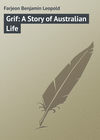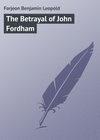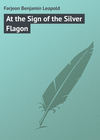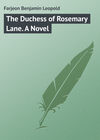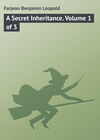Buch lesen: «Grif: A Story of Australian Life», Seite 9
It was about two o'clock in the morning, also, that Mr. Nicholas Nuttall was wending his way, somewhat; unsteadily, homeward. He had been at the Blemish banquet, and had lingered until the very last moment. Then he had been cajoled into joining half a dozen gay fellows in "just another glass," which just another glass having been submitted to a multiplication process, rendered him a decidedly unfit companion for a lady with such a strong sense of the proprieties as Mrs. Nicholas Nuttall. Some notion of this sort floated across his mind, and produced therein considerable disturbance, inasmuch as he stopped suddenly in the midst of the chorus-"We won't go home till morning," which was being trolled out by himself and a couple of young gentlemen, who had volunteered to see him home, and shook his head gravely and reproachfully.
"Ni-hic! – cholas Nuttall!" he observed, leaning his back against a lamp-post, "Ni-hic! – cholas Nuttall, you are an immoral cha-hic! – character."
The two young gentlemen, who had been induced to see Mr. Nuttall home solely because he had a pretty daughter, endeavoured to persuade him to walk on, and said, coaxingly, "Come along, old fellow. Come home."
"Home!" scornfully exclaimed Mr. Nicholas Nuttall, and regarding them with an expression of deep disdain. "Home! – hic! – do you know what home is-hic! – Home is a-hic! – place where you are badgered-hic! – and nagged-hic! – and worried. I wish you were married to Mrs. Nuttall!"
Here Mr. Nuttall began to cry, and called himself a villain, and a destroyer of domestic hearths. He allowed himself, however, to be prevailed upon to resume his homeward course, and in a very miserable condition he arrived at his street-door.
"Gentlemen!" he then said, "my wife-hic! – does not-not allow me a latch-hic! – key. Pull the bell. When you are married-hic! – have a latch key put down-hic! – in the settlements. This-hic! – is the advice of a miserable wretch."
The sound of steps along the passage drove Mr. Nuttall into a condition of abject despair. "Don't go-hic!" – he exclaimed, affectionately clinging to his companions. "Don't go-hic! – come in and have a glass-toddy."
The person who was unfastening the door had evidently heard strange voices, for it was suddenly thrown open, and a glimpse of a white nightgown flying hastily up the stairs, flitted across the vision of the three inebriates.
"Come in," said Mr. Nuttall, with a mingled feeling of exultation and dismay, for he knew that the figure in white was the figure of the wife of his bosom. "Hic! – come in, and we'll make a night of it."
But when they got in, they were doomed to disappointment. The cupboards were locked, and not a bottle or glass could be found. The young gentlemen were therefore compelled to beat a retreat. Left to himself, Mr. Nicholas Nuttall sank into a chair. He was in the enemy's camp, and he felt that there was no hope for him. With his head sunk upon his bosom, he waited doggedly for the blow.
Mrs. Nicholas Nuttall, in her nightgown, looked ridiculously diminutive; but her moral power was tremendous. Mr. Nuttall felt its effects the instant she made her appearance; and he shivered. When she seated herself opposite to him, he had not the courage to raise his head. He thought that she would speak first, but he was mistaken. He waited for a long time, and the silence grow so awfully oppressive that he was compelled to break it.
"Why did you lock up all the de-hic! – canters?" he asked.
"Because I knew the state you would come home in," returned his spouse; "and I have some regard for your health, little as you deserve it."
"You've no right, Mrs. Nuttall, to make me look-hic! – ridiculous in the eyes of my friends."
"Ridiculous!" said Mrs. Nuttall, with lofty sarcasm "As if you don't make yourself look ridiculous enough without my help! You may outrage my feelings as much as you like, sir, but you shall not turn the parlour into a tap-room, although it may be the custom in this country!"
"The two gentlemen who came home with me are very respect-hic! – table."
"Don't tell me, Mr. Nuttall!" said Mrs. Nuttall. "Gentlemen, indeed! A couple of tipsy brutes!"
"Why didn't you-hic! – go to bed? You must be very cold, sitting up with scarcely anything on."
"I am very cold. But what do you care for that?"
"Not a bit," murmured Nicholas, recklessly.
"And this man I married!" exclaimed Mrs. Nuttall, in a horror-struck voice, appealing to the chairs and tables. "This is the man I sacrificed myself for. This is the man I sit up for night after night, while he is dissipating and destroying the happiness of his family!"
"Don't be stupid-hic! – Maria!" said Mr. Nuttall, rising, and staggering to the door. "I am going to bed. Where's the door-handle? You haven't locked that up, have you?"
Mrs. Nuttall made no reply, but walked after him, statelily, with the chamber-candlestick in her hand.
"A nice example you are to your children!" she said, when she got between the sheets. "A nice example!"
"Children, Maria!" exclaimed Mr. Nuttall, before she could proceed any further. "Children! You-hic! – forget yourself, my dear. We've only got one."
"A pretty thing to reproach me with, upon my word!" exclaimed Mrs. Nuttall, indignantly. "A nice example you are, then, to our only child! I wonder you don't want to come to bed with your boots on! Oh, if I had known this before I was married-"
"It's too late now, Maria," observed Mr. Nuttall, maliciously, tugging at his boots.
"That's right," sobbed the lady, the frills of her nightcap fluttering in sympathy with her agitation. "Taunt me with my folly! But I deserve it. I brought it all on myself. Mamma warned me of the consequences, when I told her that I had accepted you; but I wouldn't listen to her, and now I am justly punished. Oh! turn your head the other way. How you smell of tobacco! 'Take my word for it,' mamma said, 'if you marry that ninny, you will repent it all your life.'" Here Mrs. Nuttall jumped up suddenly in the bed, and said, "Mr. Nuttall, there is some one walking about in the parlour."
"I don't care," murmured Nicholas, digging his head into his pillow. "He won't find much to eat and drink; that's one comfort."
"Get up and see if there is any one there, or I shan't be able to sleep a wink all the night."
"Get up yourself, and see," suggested Nicholas, drowsily.
"Is it possible," indignantly continued Mrs. Nuttall, "that any man can be so unmanly? Nicholas! Do you hear me?"
"Don't bother! Let me go to sleep!"
"Perhaps it's the new servant I took this morning. I shouldn't wonder if Australian servants walked in their sleep."
"If I thought so," murmured Nicholas, "I would go and admonish her. She's a very pretty girl."
Wifely indignation kept Mrs. Nuttall silent for awhile, but she soon commenced the nagging system again, and so worried her husband that, in an agony of desperation, he sprang up like a Jack-in-a-box, and after driving his fist fiercely into his pillow half-a-dozen times, fell back exhausted.
"Very pretty!" exclaimed Mrs. Nuttall, sarcastically. "Very pretty, indeed! I wonder you don't beat me!"
"The man who raises his hand against a woman," said Mr. Nuttall, slumberously, "except in the way of kindness, is-is-I don't exactly remember what he is. There's a thing, Maria, I have thought of often, and have never spoken of to you. It isn't right-there should not be any secrets between man and wife."
"My very words, Nicholas, my dear! What is it you are going to say?"
"In the course of our confidential conversations-as we are having now, Maria" – (in her eagerness not to lose a word, Mrs. Nuttall placed her close to her husband's lips, for he spoke very drowsily, and appeared to be addressing his pillow) – "you have frequently mentioned your respected mamma. Did she know a lady of the name of Mrs. Caudle?"
"I am not aware that she knew any person with such a vulgar name."
"You never heard her speak of Mrs. Caudle?"
"Never!"
"Strange!" murmured Mr. Nuttall. "There is a deep mystery here. For you have the Mrs. Caudle spirit so very strongly developed, Maria, that I am certain a family connection exists between you."
Not knowing whether this were meant for a compliment or a reproach, Mrs. Nuttall deemed it wise to make no comment upon it. So she proceeded to ask him about the dinner at which he had been present.
"It was a very nice dinner," said Mr. Nuttall.
"And how many people were there, Nicholas?"
"A room full."
"How do I know what sized room it was-it might hold twenty, or it might hold a thousand-how many sat down to dinner?"
"A hundred-a hundred and fifty-two hundred-two hundred and fifty," said Mr. Nuttall, vaguely.
"Was your brother there, Nicholas?"
"No."
"Did Mr. Blemish make a speech?"
"What did he say?"
"All sorts of things."
"Nicholas, you are enough to vex a saint. Tell me instantly, what did Mr. Blemish say?"
Instead of replying, Mr. Nuttall groaned, and screwed himself up tight in the bed-clothes.
"That's right," said Mrs. Nuttall, tugging at the sheets. "I'd take up the whole bed, if I were you!" Mr. Nuttall partially unscrewed himself. "I'm much obliged, I'm sure! And now, Nicholas, answer me one question. Are we going to spend Christmas at your brother's Station?"
"Yes. I have told you so a dozen times."
"I wanted to make certain," she said, sweetly. "Good night, Nicholas."
"Oh, good night," he said, somewhat savagely, muttering between his clenched teeth, "I wish the man who invented Caudle lectures had been at the bottom of the Red Sea first!"
And sleep then descended upon the Conjugal Nuttalls.
CHAPTER X.
ON THE ROAD TO EL DORADO
Far and wide, through the length and breadth of Victoria, over its borders into New South Wales, and over the seas to neighbouring Colonies, floated marvellous stories of the New Rush. Ears burned, eyes glistened, and fingers tingled at the news. Men, separated from the spot by hundreds of miles of land, by thousands of miles of ocean, made frantic arrangements to fly thither incontinently. The hearts of those in Great Britain who contemplated emigration beat faster at the news brought by the overland mail; and the tongues of the Celestials who meant to move from China to the Land of Gold chattered and wagged at a fearful rate when rumours of the big nugget reached them. Merchants grew exultant as they thought of shipments on the road, and reckoned up the profits beforehand. Servants threw up their situations; family men broke up their homes; and tradesmen wound up their businesses at any sacrifice. Cherished ambitions, life-dreams approaching to fruition, calm, peaceful ways of living, were all forgotten and forsaken in the fever of gold-greed, which spread itself through many lands.
Over the waters came regiments of adventurers, each man burning to give Nature a bruise or a blow. What brought them? Gold! It beckoned them with its golden finger, it flung a yellow shade before them, it filled their minds with desire in the day, it hopped about their brains in the night. It wooed them, and kissed them, and embraced them, and nestled in their hearts, and smiled in their eyes, and made their fingers tingle. Down to the ports of distant countries hurried cohorts of warriors, with beds upon their backs, and picks upon their shoulders. The Gold God that had awakened into life threw its irradiations thousands of miles around it, dyed the steeps of far-off mountains and illumined far-off plains. From those plains and mountains shoals of men hurried down to the ports. Ships were laid on, labourers shouted and bellowed, chains creaked and squeaked, anchors groaned and moaned, ropes strained every fibre, and bales and cases piled themselves above another, jealous not of elbow-room. Blow winds, and fill the sails! The sun is setting, and the shimmer of the Gold God is in the west, and lights the waters with a golden radiance; the sun is rising, and the shimmer of the Gold God is in the east, and is reflected on the rosy clouds; the ship is rushing onward, and the sails puff out their grey cheeks towards the promised land; the men are sleeping in their bunks, and a little image of Queen Mab, cast in pure gold, is sitting on a throne in the centre of each brain. If thought were not immaterial and colourless, the fashion of that epoch would have been bright yellow.
The Colony itself was in a ferment, and night and day the roads to the locality of the New Rush were thronged with eager pedestrians. Scraps of news, picked up Heaven only knew how, about wonderful "finds" of gold, about great nuggets and bucketfuls of the precious metal, flew from mouth to mouth. The stories lost nothing in the transmission; for pennyweights were magnified to ounces, ounces to pounds, pounds to hundredweights. Troops of sturdy diggers, their heavy "swags" upon their backs, and their tin pots and pannikins buckled to their waists, marched on bravely and cheerfully, and felt not fatigue. Truly have such men been called the bone and sinew of the gold colonies. For thorough manliness, for sturdy courage, for indomitable perseverance, they are scarcely to be paralleled in the world's history. Strings of shambling Chinamen, with pigtails and sallow faces, dressed in half-modern costume, and bearing on their shoulders poles, upon which were slung their boots, picks, shovels, and "cradles,"2 were also there, toiling patiently along to the El Dorado, and receiving with good humour the badinage of the Saxon and the Celt. They did not travel as swiftly as the Europeans; but, like the tortoise, they were slow and sure, and were not unlikely to win the race. Drays creaked and sighed in woeful tribulation beneath the weight of bags of flour and cases of spirits, sent off to the New Rush by watchful speculators. Many were the perils the goods encountered in gullies and creeks; and many were the accidents, most of them, however serious, having some ludicrous features. Here might be seen a waggon piled up with diggers' swags, chiefly Chinamen's, the owners being perched on the top, while the remainder trudged patiently along in the dust. There, a troupe of Nigger serenaders, with bones and banjos, their faces already blackened for the amusement of the wandering hordes. Here, a couple of drays, in which were packed cases of type and printing-press for the printing of a newspaper in the bush! There, a travelling theatre, consisting of a huge tent with all the paraphernalia of scenery and dresses: the leading tragedian (descended to dull earth) played the part of driver for the nonce, entertaining his cattle with morsels of morality from Hamlet or Macbeth; while the low-comedy man, his face woefully begrimed with dust, tramped sturdily along, bearing upon his shoulders the infant prodigy of the company. Day after day the roads were thronged with workers from all parts of the colony, and when night came, trees were cut down and fired, horses and oxen were turned loose, water was fetched from adjacent creeks, tea was prepared, and pipes were lighted, and tents and "mi-mis"3 hastily thrown up, beneath which the nomades rested their weary limbs, hopefully and cheerfully. It was a pretty sight to see the fires glancing out along the miles of dusky bush, and it was pleasant to feel the sense of rest which had fallen upon the busy plains. The tinkling bells attached to the necks of hobbled horses led musically on the air, and from silver-toned flutinas, in the hands of rough-bearded men, sounded "Home, Sweet Home," and many other airs as touching, the strains of which lingered lovingly about the trees, whose dark forms were glanced with light from a clear and brilliant moon.
Amongst those who were attracted to the promised land by the news of the wonderful discoveries was Richard Handfield. He had picked up as a mate an old digger, whose Herculean frame appeared fit to bear any amount of fatigue-a man known as Tom the Welshman, and commonly called Welsh Tom for brevity's sake. He was a simple, kind-hearted creature, always ready to do a good turn, and not always able to avoid being imposed upon. He was fond of nursing children, and drawing water, and chopping wood, to lighten the labours of the women who were fortunate enough to be living in his neighbourhood. He was a lucky digger, and he scattered his gold about freely. He had been in the Colonies since his youth, and for a great portion of his time he had been a bullock-driver. One might have thought that this would have been sufficient to make him cruel and hard-hearted; but the contrary was the case. He swore at his bullocks like other bullock-drivers, but he did not lash them. Even when he swore at them, the poor oxen seemed to know that he was not unkindly; and if such a feeling as gratitude be inherent in bullock nature, it must surely have been strong in the Welshman's oxen, for he regarded with pity a sore shoulder or a wound, and would apply such simple remedies as he was acquainted with to ease the pain. And yet, gentle as he was by nature, loved as he was by all his acquaintances, there was a stain upon him which would never, in this world, be wiped out. He had been convicted of some offence in the home country, and had been sentenced to life transportation. He did not often refer to this portion of his career, although, when the subject arose, he solemnly and consistently protested his innocence. He never travelled without his concertina, from which he extracted the most exquisite music. But his greatest treasure was an old Welsh Bible; which had been his mother's, and no night passed without his reading a chapter from it. He was fond of his glass, was the Welshman, and sometimes he took more than was good for him. On such occasions he would retire to some secluded spot, and, bareheaded, preach to the hills in red-hot Welsh. It was a thing to remember, was the sight of this gaunt, strong man, flinging his arms wildly about in his enthusiasm, while the impassioned gutturals rolled fast and furious from his throat. Those who knew him never interfered with him when he was in such ecstasies; he was perfectly harmless, and on the succeeding morning was always up with the sun, ready for work.
Richard Handfield was fortunate in picking up Welsh Tom for a mate; for Richard was an idle fellow, while the Welshman buckled to his work with overwilling zeal. When their day's walking was done, and a suitable place had been found to camp in, it was the Welshman who felled the tree, and the Welshman who fetched the water from the creek, and the Welshman whose ready hands extemporised a sleeping-place; while all that Richard did was to gather a few branches and to make the tea. Even this he did unwillingly and grumblingly, repining at what he thought his hard lot. He had never been used to work, and, although he and his mate had walked but twenty-five miles that day, his feet were blistered, and he was sore and weary. The Welshman, whose limbs were hardened by constant exposure and years of toil, felt as fresh as when he started in the morning, and could have walked another twenty-five miles with ease. But, anxious as he was to arrive quickly at the new diggings, he did not grumble at the short day's journey, and, when tea was over, he sat down, pipe in mouth, with perfect contentedness.
Of course, the talk between them was of the new gold discovery, which had been made upon an immense plain.
"Discovered by Chinamen, eh, Tom?" queried Richard.
"Yes, Dick," answered the Welshman. (It is soon Tom and Dick with new acquaintances upon gold-fields. The conventional "Mr." is but seldom used, and never among diggers.) "John Chinaman got the first bite."
"Just like their luck," grumbled Richard; "why couldn't a white man have found it?"
Tom did not reply, for in common with most of the European gold diggers, he entertained a very low estimate of the Mongolian race, and looked upon them in the light of interlopers.
"I always thought gold would be found in that quarter," he said, presently; "I passed over the flat six years ago, and I almost fancied I could see the gold at the bottom."
"I should have tried it," said Richard.
"I was taking a load of wool down to Melbourne at the time, and I was single-handed. Besides, it's a thousand chances to one if I had hit upon gold. A rich gold-field gets scratched over a hundred times before it's found out. No gold-field ever is any good, or ever proves itself very rich, until a big rush sets into it."
The conversation not being continued, Welsh Tom took his concertina from its case, and played some simple melodies. Attracted by the sounds, a party of diggers, camping not many yards away, strolled towards the spot, and stood about the musician in easy attitudes, listening to his music. At the conclusion of a little piece of delicious extemporising, one of the party asked the Welshman to play "Shades of Evening," which he did very sweetly; and then the same man said, "Play 'Alice Gray,' mate." It was an especially favourite air with the Welshman, and he played it with much feeling. As the last note died softly away, the diggers strolled back to their camping-place.
Perhaps the only one who heard the melodies, and who was not thoroughly softened by them, was Richard Handfield. In the hearts of the rough diggers there was a stir of deep emotion as the sounds travelled into space; the music of sweet remembrance dimmed many an eye, and took their thoughts from the strange present into the realms of long ago. But not so with Richard. His was a nature that needed constant control. With Alice by his side to strengthen him, he could be strong; left to his own resources, his weak nature asserted itself in repinings. He pined for a result, but had not sufficient strength of purpose to work for its accomplishment. Thus, fortified as he was, brave as he felt himself to be, when he parted from Alice, no sooner was he torn from the influence of her presence, than he became again a murmurer at hardships of his lot. The picture of this man's nature is a true one, and is not overdrawn.
He sat, on this evening, moody and discontented, looking with a dash of contempt at the Welshman, who, reclining upon the earth, with his back against a tree, was playing softly the old familiar airs. He could not help thinking that this man was beneath him, this man who could be contented with so little, and who had no disturbing memories to render him miserable. At the same time he was envious of him, as was evidenced by the remark he made.
"I wish I was like you, Welshman."
"Like me!" the Welshman exclaimed, in a tone of simple surprise.
"Yes; you haven't a care. No wife, no children, no ambition. Give you your pipe and your concertina, and you are happy and contented."
Welsh Tom sighed, and said, "And you?"
"I am the most miserable dog in the world. I wish I had never been born."
"There's no use in wishing that, mate. The best way is, to make the best of it."
"That's all very well for you. You have led a rough life, and are used to it. I wish I had been brought up like you. It would have been all the better for me."
Welsh Tom sighed again, but did not reply.
"I was brought up as a gentleman," continued Richard, following the current of his own selfish thoughts, "and just at my age, when I ought to be enjoying life, I have to sweat for my living. You would not think of it so lightly if you were married-"
"I think it would make life all the sweeter," said the Welshman, simply.
"You think!" exclaimed Richard, so disdainfully, that any man but the Welshman would have fired up. "What do you know of marriage and its responsibilities?"
"Nothing."
"What do you know of the weight it is upon a man, what a clog it is upon him when he is in misfortune; how it frets him and worries him, and drives him almost mad? Why, I doubt if you have ever been in love!"
"I don't think I have."
"Well, then," said Richard, impatiently, "what's the use of talking about it?"
"Not much; yet I've sometimes wished that my life had been different. I've sometimes wished that I had a woman to love me, and children to bring up. I've often thought, What use am I, rough and strong as I am, in the world? I have been sinful enough at times to envy my mates who had wives and children; and, as I've laid myself down upon my bed, have wished that I could hear the prattle of children about my pillow. Foolish of me, no doubt!"
"Better to be without them. You have no cares and no one but yourself to look after. Why, look here! I have a wife whom I married for love-her father is a wealthy hunks, but he discarded her for marrying me. What is the result? Misfortune pursued me, and we are both miserable. Would it not have been better that we had never met? Of course it would. So you may thank your stars that you haven't a wife to drag your thoughts down to desperation point, as my wife does mine."
"Isn't she a good wife?"
"Fifty thousand times too good for me."
The Welshman refilled his pipe, and, after puffing for a few moments, said-
"What one man sighs for, another man groans at. Of course it's absurd tor such a rough-and-ready chap as me to say that if I had a wife fifty thousand times too good for me, I should look upon her as a blessing. I've never had much experience of women. The only woman I ever loved was my old mother; but although I dare say I am ignorant enough with regard to womankind, I often think that the world is like a garden, and that the women and children are the flowers in it."
"Is the world like a garden to you! I've heard that you've had pretty hard lines in it, too."
"So I have. But, you see, it is not my fault. I might make things worse for myself, but I don't know how I could make them better."
"Very fine philosophy that, I dare say," Richard continued to grumble; "but all men are not made the same, and all men don't think the same. What is one man's meat is another man's poison. You like this sort of life; you don't feel it any hardship to walk thirty or forty miles a day. You were never brought up to expect anything better. I was. And I can't sit still, and be grateful for misfortune."
Far away, through the miles of tall gaunt trees that stood in dark relief, like sentinels of the night, the watch-fires were glimmering! men bodily weary, but into whose hearts had stolen the peacefulness of nature, were lying contentedly about, enjoying the sweet incense of repose. Heaven's eyes were looking down upon them; God's handiwork surrounded and encompassed them. The solemn trees, the bright stars; the evanescent flash that marked the lizard's track; the hushed air that glided through the forests of the New World, the faintest tracery of whose minutest leaf is more marvellous than man's greatest work; and all the myriad visible and invisible wonders of the wondrous earth: contributed to the holiness of the night. The Welshman looked round and beyond, where the glimmering watch-fires lost themselves in dark depths. Then he looked at Richard, and said, as if wishful to woo him to a softer mood, -
"If she were here-"
"My wife?" queried Richard.
"Your wife. If she were here, she would think this very beautiful."
"If she were here," said Richard, less fretfully; and then more softly still, he repeated, "If she were here-ah! I know what I would wish."
"What?"
"I should wish but first (I don't mind telling you, Welshman, for you are a good fellow, I think), I should like to lie with my head in her lap, and see her soft eyes looking into mine-I should wish that we might fall asleep upon this peaceful night, and never wake up again! What a grand and awful thing to think of! All of us, as far as we can see, to fall asleep for ever, and for it to be always quiet and peaceful as it is now. Yet quiet as it is, I do not feel inclined for sleep."
"I will tell you my story, if you like," said Welsh Tom. "It isn't very long, and I don't suppose it is very interesting. But I feel as if I should like to tell it to-night."
"All right," said Richard, with some slight show of curiosity. "I'm listening."
